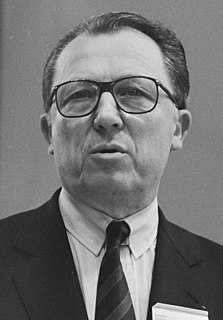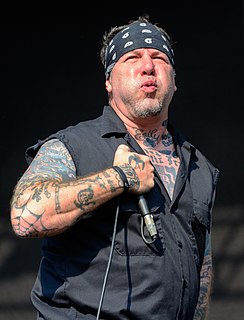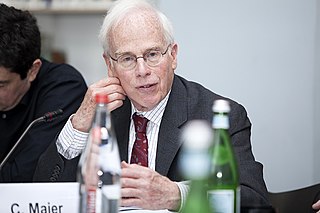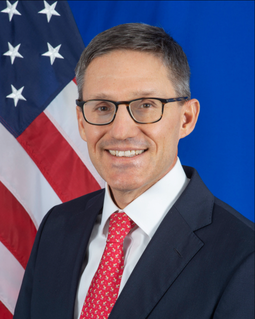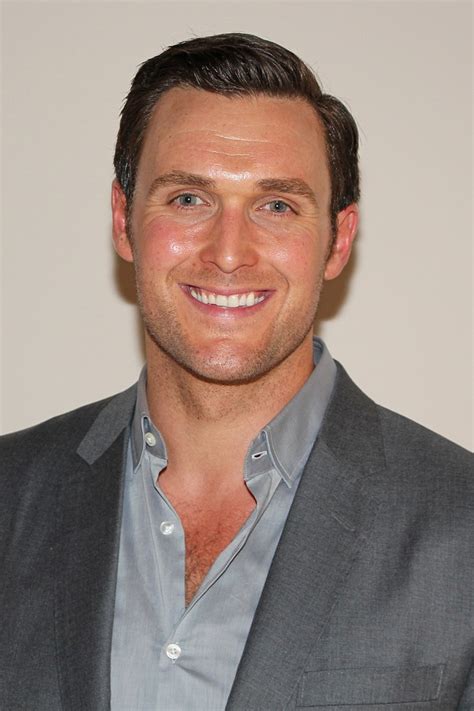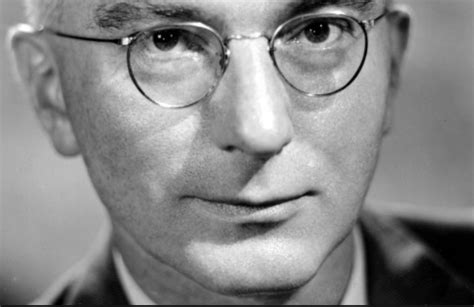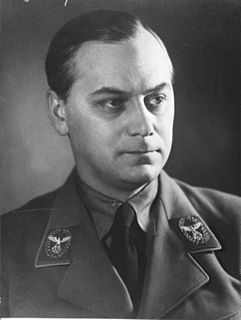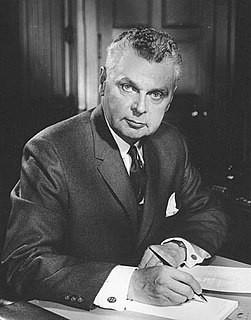Top 1200 European History Quotes & Sayings - Page 5
Explore popular European History quotes.
Last updated on April 21, 2025.
My objective is that before the end of the millennium Europe should have a true federation. The Commission should become a political executive which can define essential common interests... responsible before the European Parliament and before the nation-states represented how you will, by the European Council or by a second chamber of national parliaments.
There are of course economic advantages to having Turkey as a member of the European club. It's a developing country with a large, reasonably well-trained labor force at a time when the European birth rate is dropping at a catastrophic rate and Europe is graying. It offers opportunities for greater trade and investment to the benefit of both Turkey and Europe.
A glance at the history of European poetry is enough to inform us that rhyme itself is not indispensable. Latin poetry in the classical age had no use for it, and the kind of Latin poetry that does rhyme - as for instance the medieval Carmina Burana - tends to be somewhat crude stuff in comparison with the classical verse that doesn't.
I would go to the European institutions, I would demand for the French people four sovereignties: territorial - our borders; monetary and budgetary; economic; and legislative. Either the European Union says yes to me, or they would say no, and I would say to the French, there is no only other solution but to leave the E.U.
I embraced Hinduism because it was the only religion in the world that is compatible with National Socialism. And the dream of my life is to integrate Hitlerism into the old Aryan Tradition, to show that it is really a resurgence of the original Tradition. It's not Indian, not European, but Indo-European. It comes from back to those days when the Aryans were one people near the North Pole. The Hyperborean Tradition.
Given currency by Jrgen Habermas in the late l980s, 'constitutional patriotism' has emerged as an appealing principle for post-national political allegiance. Jan-Werner Mller traces the long postwar history of the concept, takes honest account of the conservative critiques it has provoked, but proposes that it can serve as a robust norm for European Union citizenship. This is a profound meditation with real importance for contemporary political society.
The rule of law means that law and justice are upheld by an independent judiciary. The judgments of the European Court of Justice have to be respected by all. To undermine them, or to undermine the independence of national courts, is to strip citizens of their fundamental rights. The rule of law is not optional in the European Union. It is a must.
African films should be thought of as offering as many different points of view as the film of any other different continent. Nobody would say that French film is all European film, or Italian film is all European film. And in the same way that those places have different filmmakers that speak to different issues, all the countries in Africa have that too.
The introduction of the Christian religion into the world has produced an incalculable change in history. There had previously been only a history of nations--there is now a history of mankind; and the idea of an education of human nature as a whole.--an education the work of Jesus Christ Himself--is become like a compass for the historian, the key of history, and the hope of nations.
The settler makes history and is conscious of making it. And because he constantly refers to the history of his mother country, he clearly indicates that he himself is the extension of that mother country. Thus the history which he writes is not the history of the country which he plunders but the history of his own nation in regard to all that she skims off, all that she violates and starves.
Black History is enjoying the life of our ancestors who paved the way for every African-American. No matter what color you are, the history of Blacks affected everyone; that's why we should cherish and respect Black history. Black history changed America and is continuing to change and shape our country. Black history is about everyone coming together to better themselves and America. Black history is being comfortable in your own skin no matter what color you are. Black history makes me proud of where I came from and where I am going in life.
The danger is not only that these austerity measures are killing the European economies but also that they threaten the very legitimacy of European democracies - not just directly by threatening the livelihoods of so many people and pushing the economy into a downward spiral, but also indirectly by undermining the legitimacy of the political system through this backdoor rewriting of the social contract.
The common fisheries policy essentially gave other European Union nations unfettered access to our fish stocks and - I would hope - that if we leave the European Union, we can once more see the ports of Peterborough and Fraserhead and Grimsby flourishing, because we will take back control of our territorial waters.
I have to throw in on a personal note that I didn't like history when I was in high school. I didn't study history when I was in college, none at all, and only started to do graduate study when my children were going to graduate school. What first intrigued me was this desire to understand my family and put it in the context of American history. That makes history so appealing and so central to what I am trying to do.
A glance at the history of European poetry is enough to inform us that rhyme itself is not indispensable. Latin poetry in the classical age had no use for it, and the kind of Latin poetry that does rhyme - as for instance the medieval 'Carmina Burana' - tends to be somewhat crude stuff in comparison with the classical verse that doesn't.
I have criticized foreign policy, but that does not mean that we should agree with everything. Indeed, we criticize a lot of things, we think that our partners make many mistakes [may be we make mistakes too, no one is immune to making mistakes], but as for the economy, I repeat that, in my opinion, the European Commission and the leading European economies are acting very pragmatically and are on the right path.
In the index to the six hundred odd pages of Arnold Toynbee's A Study of History, abridged version, the names of Copernicus, Galileo, Descartes and Newton do not occur yet their cosmic quest destroyed the medieval vision of an immutable social order in a walled-in universe and transformed the European landscape, society, culture, habits and general outlook, as thoroughly as if a new species had arisen on this planet.
It is clear that Germany needs a foreign policy in which we jointly define European interests. Thus far, we have often defined European values, but we have been much too weak in defining mutual interests. To preempt any possible misunderstandings: We cannot give short shrift to our values of freedom, democracy and human rights.
Christians have ... identified their opponents, whether Jews, pagans, or heretics, with forces of evil, and so with Satan... Nor have things improved since. The blood-soaked history of persecution, torture, murder, and destruction perpetrated in the name of religion is difficult to grasp, let alohne summarize, from the slaughter of Christians to the Crusades to the Inquisitiion to the Reformation to the European witchcraze to colonialization to today's bitter coflict in the Middle East.
The development of European integration can be divided into two phases. The first era ended with the Maastricht Treaty. It was a liberalization phase, with the main goal of European integration at the time being the removal of various barriers and borders in Europe. The second phase is a homogenization or standardization phase, one that involves regulation from the top and growing control over our lives. This no longer has anything to do with freedom and democracy.
We should emphasize not Negro History, but the Negro in history. What we need is not a history of selected races or nations, but the history of the world, void of national bias, race, hate, and religious prejudice. There should be no indulgence in undue eulogy of the Negro. The case of the Negro is well taken care of when it is shown how he has far influenced the development of civilization.
The fact that we're going through a crisis is an opportunity for Europe to be more coordinated and more integrated. We're actually talking about a European Monetary Fund or euro bonds, about guarantees for countries, about economic governance in the European Union. That shows the strength of Europe.
History is my passion. So I write what I love to read. I find that if I combine history with a strong, sensual romance, it is like a one-two punch. The reader doesn't want the history without the romance, and of course the heavier the history, the more it has to be leavened with a sensual, all-consuming love story.
To be sure, changes in American family structure have been fairly continuous since the first European settlements, but today thesechanges seem to be occurring so rapidly that the shift is no longer a simple extension of long-term trends. We have passed a genuine watershed: this is the first time in our history that the typical school-age child has a mother who works outside the home.
The Soviet Union was brought down by a strange global coalition of Western European conservatives, Eastern European nationalists, Russian liberals, Chinese communists, and Afghan Islamic reactionaries, to name only a few. Many of these discordant groups disliked the United States intensely. But Americans were able to mobilize them to direct their ire at the Soviet Union first.
We are patriotic enough to believe there is no good reason why foreign investors from Europe cannot be expected to resolve any disputes fairly through British justice, operating through British courts. And we are European enough to think that our companies can do the same by relying on European courts.
It [the scientific revolution] outshines everything since the rise of Christianity and reduces the Renaissance and Reformation to the rank of mere episodes, mere internal displacements, within the system of medieval Christendom. . . . It looms so large as the real origin of the modern world and of the modern mentality that our customary periodization of European history has become an anachronism and an encumbrance.
I should also say that apart from the negotiations that are taking place within the WTO, we are ourselves involved in all manner of bilateral negotiations, or, if they are not bilateral, with the South African Customs Union and the European Union. All the member countries of the European Union have now ratified the agreement that we have with the EU and that opens up the EU market in various ways.
[In the Field Museum of Natural History] we could see very simple, primitive, hand-built pottery from Babylonia and ancient Egypt and so forth, Greece. We could see the most sophisticated things that came out of the Orient - Japan, Korea, and China - some few pieces of European porcelain, majolica [tin glazed earthenware], and that sort of thing. But they had a marvelous collection.


